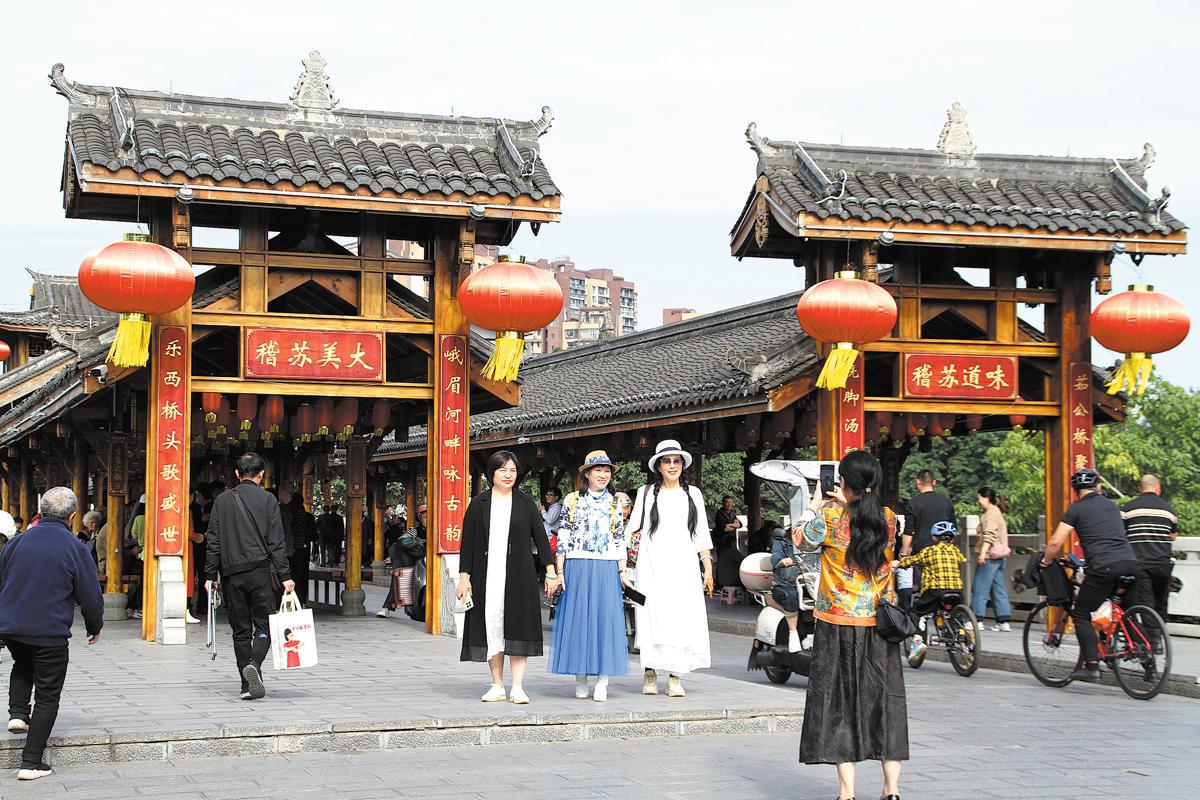Local cuisine boosts Sichuan tourism


While many ancient towns across China often face criticism for their homogenized tourism offerings, some in Sichuan province are winning increasing favor among tourists with distinctive cultural experiences.
The 1,400-year-old Suji ancient town, situated by the Emei River in Leshan, Sichuan, has regained vitality in recent years by developing its characteristic catering industry represented by qiaojiao beef, a stewed beef offal hotpot.
The signature dish was invented in the late 19th century by a Suji resident who simmered discarded beef offal with aromatic spices using a unique cooking technique. It soon became popular among dockworkers for its affordability and rich flavor.
In 2023, the craft of making qiaojiao beef was listed as a Sichuan provincial-level intangible cultural heritage.
Xian Yaqin, an official at Suji township in Shizhong district of Leshan, said the local government invested nearly 400 million yuan ($56 million) to build the ancient town into a qiaojiao beef characteristic town — the first town in Sichuan named after a dish.
Today, the ancient town is home to over 80 restaurants specializing in qiaojiao beef, and there is a qiaojiao beef museum, along with other restaurants or stores selling other local specialties, such as crunchy rice candy, sweet-skin duck, and boboji (cold chicken skewers in spicy broth).
Fu Ruiyi, deputy director of Shizhong district's cultural and tourism promotion center, said Suji is a key transit point between Mount Emei and the Leshan Giant Buddha, which were jointly designated as a UNESCO natural and cultural heritage site.
"The ancient town's geographical advantage and distinctive cuisine and snacks have quickly made it a popular tourist destination," Fu said.
Official data show that in the first seven months of this year, Suji received over 6.3 million tourists, with comprehensive tourism revenue exceeding 600 million yuan. Both figures achieved double-digit year-on-year growth.
Yang Xia, manager of the flagship restaurant of Laoniujin Qiaojiao Beef, said that the restaurant receives 6,000 to 7,000 customers a day during peak tourist seasons, with daily sales reaching about 200,000 yuan.
Fu added that the ancient town has been continuously enriching its cultural tourism offerings so as to attract more tourists.
Beyond food, visitors can take a night tour on a bamboo raft on the Emei River, experience traditional embroidery and silk weaving, and watch folk performances such as cormorant fishing and Niu'er Deng, a traditional cattle lantern dance.
"A newly built Olympic sports center to the north of the ancient town has begun hosting concerts this year, bringing a growing number of visitors," Fu said.
Lizhuang, another ancient town in the province's Yibin, has emerged as a popular tourist destination by revitalizing cultural sites from the Chinese People's War of Resistance Against Japanese Aggression (1931-45), while developing its characteristic cuisine and cultural and creative products.
Located on the southern bank of the Yangtze River, China's longest river, Lizhuang was one of China's cultural centers during the war against Japanese aggression, as it sheltered over 10 famous research institutions and universities during that period.
To upgrade the ancient town's tourism infrastructure while preserving its cultural heritage, Lizhuang launched the Yueliangtian Scenic Area project in April 2020 with a total investment of 1.8 billion yuan.
A tourist surnamed Wang from Chengdu, the Sichuan capital, said she was impressed by the ancient town as it blends ancient charm with modern vitality, along with delicious foods rarely found elsewhere.
Liao Xiaomin, a restaurant owner, said her business is thriving thanks to local specialty dishes such as Lizhuang white meat, yellow catfish, and huangba (brown sugar glutinous rice cake), which are highly popular among visitors.
"Over the past year, our daily revenue during holidays has surged from between 20,000 and 30,000 yuan to between 60,000 and 80,000 yuan," Liao said, adding that she was delighted to receive a group of foreign customers recently.
Zhang Jianhua, an employee of Yiren Yili, a local brand dedicated to developing Yibin's characteristic cultural and creative products as well as specialty foods, said Lizhuang has seen a noticeable increase in out-of-town visitors in recent years, leading to a significant boost in sales for his shop.
Contact the writers at pengchao@chinadaily.com.cn




































